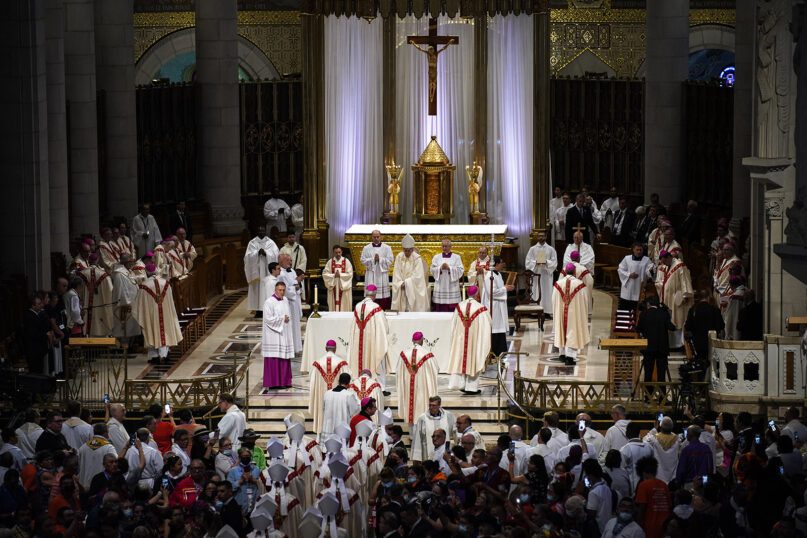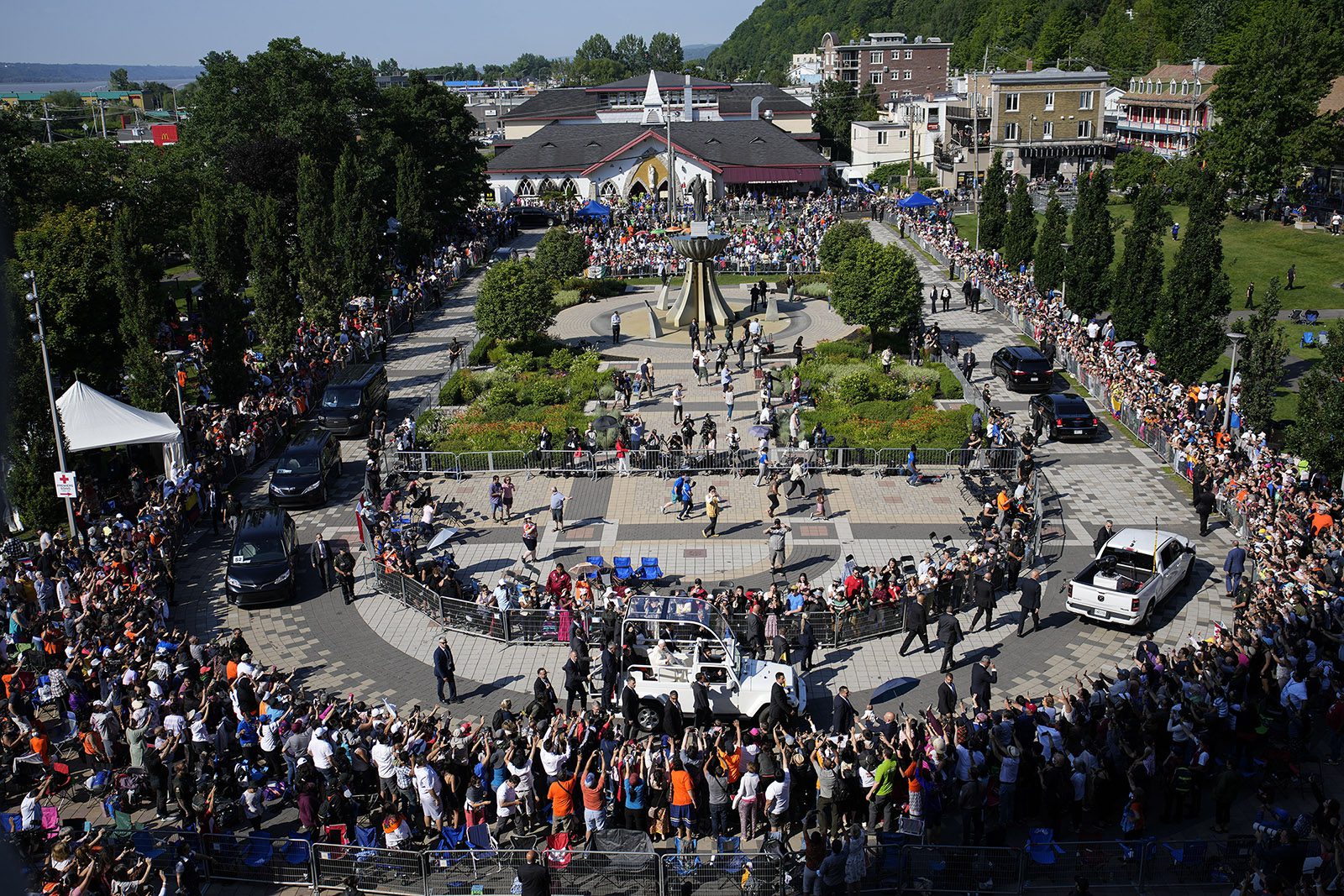NEITHER DO HUMANISTS OR ATHEISTS
God does not want ‘a world governed by religious laws,’ pope tells Canadian clergy
(RNS) – To overcome secularism and past failures, Pope Francis called on Canadian clergy to embrace the journey toward healing and reconciliation.

QUEBEC CITY (RNS) — On his second day in Quebec City, Pope Francis offered a path forward for the Catholic Church in Canada as it seeks forgiveness and reconciliation with the Indigenous peoples harmed by its past actions. He also addressed the challenges of both clericalism in the church and mounting secularism in the country.
In a homily on Thursday (July 28) for clergy and church members gathered at the Cathedral of Notre Dame, the pope also criticized those who would impose the church’s beliefs on the public square.
“God does not want us to be slaves, but sons and daughters,” Francis said. “He does not want to make decisions for us, or oppress us with a sacral power, exercised in a world governed by religious laws. No! He created us to be free, and he asks us to be mature and responsible persons in life and in society.”
The pope’s remarks take place as Christian nationalist rhetoric gains traction in conservative political parties in Europe and in the United States. Recent comments by Colorado Rep. Lauren Boebert, claiming she is “tired of this separation of church and state junk,” have sparked debates in the U.S. regarding the role of religion in government.
His comments were also aimed at combating clericalism — privileging clergy and religious people above lay faithful in authority and importance — which the pope has blamed for allowing sexual abuse and abuse of power to propagate within the Catholic Church.
Francis is on a six-day, self-described “penitential pilgrimage” in Canada (July 24-29), where he has formally apologized to First Nations, Metis and Inuit peoples who have suffered oppression and had their cultures nearly eradicated by religious and government authorities.
For the church to be credible on its “new path” toward reconciliation with Indigenous peoples, it must acknowledge and atone for its past failures, the pope said. For the first time since his arrival in Canada, the pope acknowledged the sexual abuse of minors and vulnerable adults perpetrated by clergy in the country, calling for “firm action and an irreversible commitment.”
“Together with you, I would like once more to ask forgiveness of all the victims. The pain and the shame we feel must become an occasion for conversion: Never again!” he said. “Never again can the Christian community allow itself to be infected by the idea that one culture is superior to others, or that it is legitimate to employ ways of coercing others.”
Mending the relationship with the disenfranchised Indigenous community is not the only challenge facing the Catholic Church in Canada today, the pope said. “We can immediately think of secularization,” Francis said, which has relegated faith and God “to the background.”
“God seems to have disappeared from the horizon, and his word no longer seems a compass guiding our lives, our basic decisions, our human and social relationships,” he added.
Instead of trying to impose religion on the state or lamenting the bygone times when clergy swayed political power, the pope said, “secularization demands we reflect on the changes in society that have influenced the way in which people think about and organize their lives.”
It’s not the faith that is suffering a crisis, he continued, “but some of the forms and ways in which we present it.”

Pope Francis arrives for Mass at the National Shrine of Saint Anne de Beaupre, Thursday, July 28, 2022, in Saint Anne de Beaupre, Quebec. (AP Photo/John Locher)
To address this, the church must have “pastoral creativity,” the pope said. Francis offered suggestions for clergy on how to embrace this transformation. He called on the church to preach the gospel in a way that reveals “the freedom that sets others free, the compassion that asks for nothing in return, the mercy that silently speaks of Christ.”
To be credible, he continued, the church must act as a witness. “We must begin with ourselves: bishops and priests,” he said, “who should not feel themselves superior to our brothers and sisters in the people of God. Pastoral workers, who should not understand service as power.”
Fraternity is the final element needed for the church’s transformation, he said, to create “a welcoming community” that is “capable of listening, entering into dialogue and promoting quality relationships.”
RELATED: Pope Francis condemns colonialism, old and new, in speech to Canadian authorities
On Thursday morning, Pope Francis said Mass before 2,000 faithful at the National Shrine of St. Anne de Beaupré, where his predecessor St. John Paul II met with Indigenous peoples for the first time during his apostolic visit to Quebec City in 1984.
Francis encouraged Catholics to embark on a “a journey from failure to hope,” referring to the atrocities committed toward the Indigenous peoples of Canada. “In confronting the scandal of evil and the body of Christ wounded in the flesh of our Indigenous brothers and sisters, we too have experienced deep dismay; we too feel the burden of failure,” he said.
“Nothing could be worse than fleeing in order to avoid it,” he said, while adding that only through faith and the gospel can one experience “the operative presence of God’s love and the potential for good even in apparently hopeless situations.”
Thousands of faithful gathered outside the shrine to catch a glimpse of Pope Francis. While many cheered him on as he circled the area aboard his popemobile, others held signs calling for the pope to take actions to accompany his words of remorse, including rescind the Doctrine of Discovery, a centuries-old papal mandate that allowed Western nations to colonize and spread Christianity in the New World.
No comments:
Post a Comment